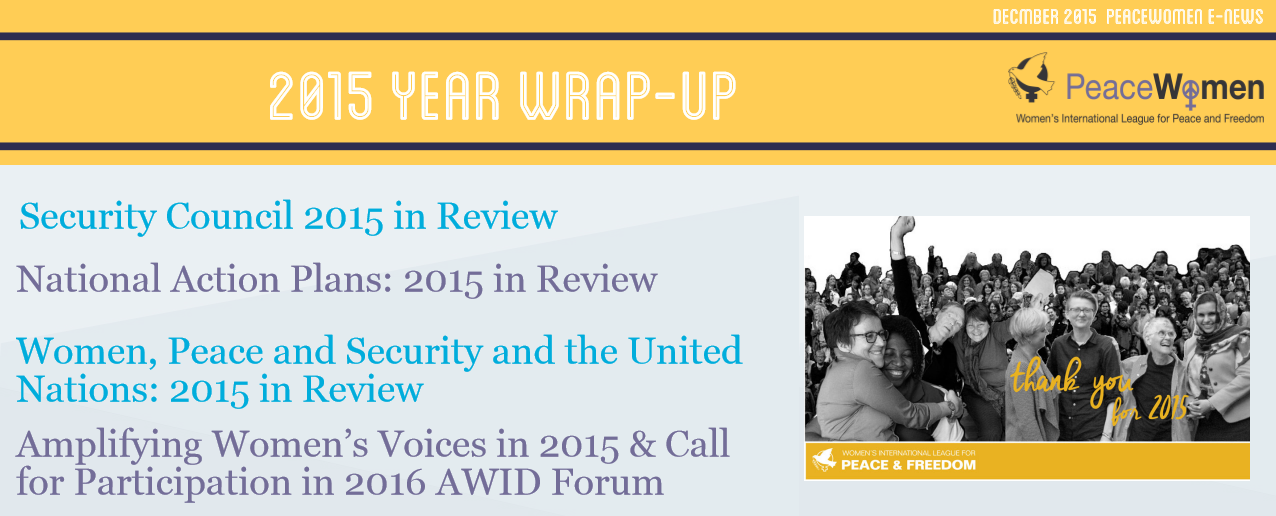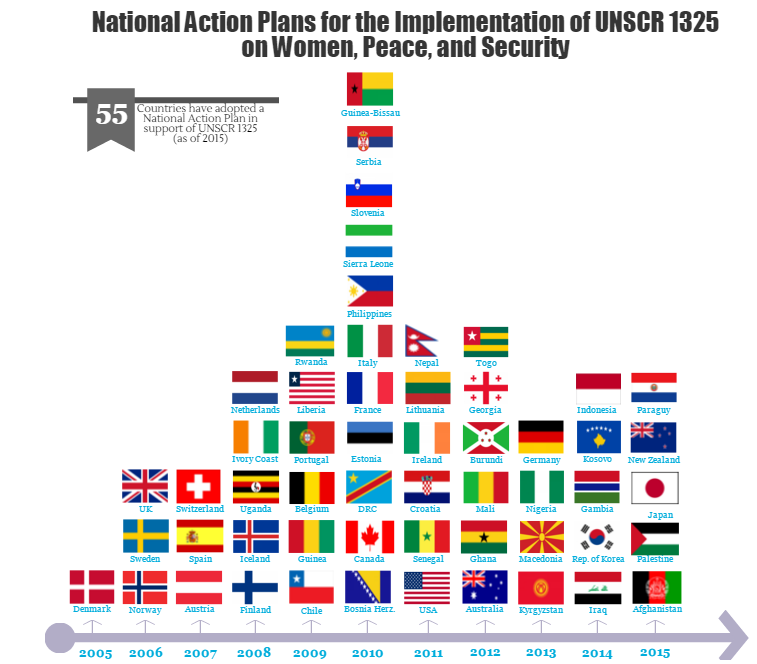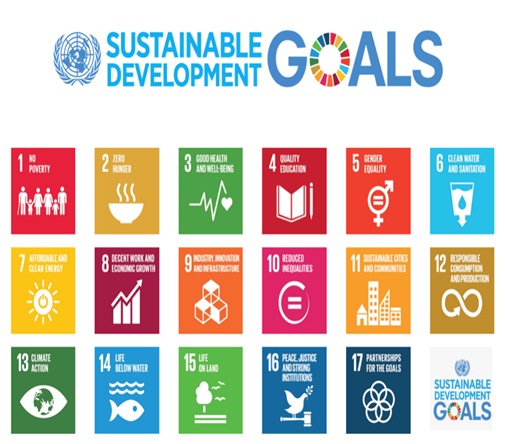2015 Year Wrap-Up

2015 Year Wrap-Up
By: Ghazal Rahmanpanah, Programme Associate (PeaceWomen)
2015 has been both a tumultuous and important year. With milestones from the fifteenth anniversary of UN Security Council Resolution 1325, to the 20th anniversary of the Beijing Platform for Action, to the 70th anniversary of the United Nations, to the 100th anniversary of WILPF, commitments have been loud.

Photo Credit: Women’s International League for Peace and Freedom
While milestones and anniversaries have been celebrated, there is still much that needs to be done. Globally, we are witnessing the worst humanitarian and refugee crisis since World War II, due in major part to indiscriminate shellings of civilians, including in Yemen and Syria, and a militarised response to violent extremism and violence. And yet, even after the three Peace and Security Reviews concluded that the international community must move away from militarised action and quick use of force in response to violence and insecurity, we are witnessing renewed calls for war and continued rising of military spending. Further, while overall rhetoric claims otherwise, financing of peace and security efforts have been cut substantially even though war budgets have only grown.
PeaceWomen has taken action, across the year, to leverage these milestones and turn commitments into accomplishments. We have amplified the voices of grassroots women peace activists and connected local and global action to demand transformative change. This includes facilitating delegations at the Commission on the Status of Women, the UN General Assembly, and the October High-Level Review of the Women, Peace and Security Agenda, from countries including Colombia, Cameroon, Democratic Republic of Congo, Nigeria, Lebanon, and Syria. We will continue to push for a feminist foreign policy that focuses on demilitarisation, disarmament, women's human rights, and sustainable human security for all.
We have built momentum around a holistic, human rights-based approach to security and development that strengthens accountability on the Women, Peace and Security Agenda. As we prepare for 2016, we will continue to step up our efforts to ensure a feminist lens towards peace and security and hold governments and UN entities accountable for commitments on Women, Peace and Security. We have worked with our coalitions including the NGO Working Group on Women, Peace and Security, to successfully advocate for inclusive civil society engagement in the now 8th resolution on Women, Peace and Security United Nations Security Council Resolution 2242 (2015). We successfully advocated for demilitarisation to be recognised as a key recommendation of the Global Study on the Implementation of United Nations Security Council Resolution 1325.
This special edition of our PeaceWomen E-Newsletter provides a recap of some of the major milestones within the Women, Peace and Security Agenda of the year. We would like to thank our civil society colleagues, international organisations, governments, and our donors for their support so that we can continue our important work. PeaceWomen looks forward to 2016 and the coming year to make even more progress towards a feminist foreign policy approach for all.
We believe that now is the time to demand that rhetoric become reality. If you would like to support our work for this coming year, please consider donating to PeaceWomen as part of the Women’s International League for Peace and Freedom (WILPF). Thank you for considering us in your holiday giving this year.
Happy Holidays from the PeaceWomen team! Wishing peace to all in the New Year!
Security Council: 2015 in Review
By: Federica Dall’Arche Ciranna

Photocredit: United Nations
2015 was a very busy year for PeaceWomen! In the last 12 months, we have monitored and analysed over 14 thematic debates and 55 Resolutions, developing summaries and detailed gender analyses. The fruits of our work can be found on the Security Council section of our website.
Looking back at the “loud” year, the months of April and October were especially important for us, as during these months, the Security Council focused its work on the Women, Peace and Security Agenda. October also marked the 15th anniversary of the adoption of United Nations Security Council Resolution 1325. The outcome of the October Open Debate was the unanimous adoption of a new Resolution, UNSC 2242, that was co-sponsored by a record-breaking of 75 states, and now the eighth member of the Women, Peace and Security Agenda.
This year, a remarkable number of countries committed to the implementation of the Women, Peace and Security Agenda, both financially and politically. During our monitoring work, we were pleased to note these noble intents. We remind states, as they prepare for 2016, that these commitments must be translated into concrete actions.
Tools You Can Use in 2016:
2015 Security Council Scorecard
Newly updated and re-launched PeaceWomen App
National Action Plans: 2015 in Review
By: Marta Bautista

As part of our monitoring work to strengthen accountability, PeaceWomen continues to monitor and analyse Member States National Action Plans (National Action Plans) on United Nations Security Council Resolution 1325.
Afghanistan, Japan, New Zealand, Palestine and Paraguay released a new National Action Plan this year. With them, as of December 2015, 55 nations have created a National Action Plan on United Nations Security Council Resolution 1325, which accounts for about 28.5% of the countries worldwide. While there is still much work to do, it is a positive step forward to have 10 new countries commit to developing a new National Action Plan in 2016. These countries are: Algeria, Angola, Brazil, Kazakhstan, Kenya, Latvia, Portugal, Thailand, Ukraine and the United Republic of Tanzania.
In October, the Security Council organised a High Level Review to assess progress at the global, regional and national levels in implementing United Nations Security Council Resolution 1325 (2000), renew commitments, and address obstacles that have emerged. Within the 2015 commitments on the Women, Peace and Security Agenda, there was a notable increase in language and commitment towards increasing women’s participation, however, much of the language focused on the role of women’s participation in countering violent extremism. Further, the language on this remains quite vague and often times solely emphasized women’s inclusion in security sector roles.
During the Open Debate, countries such as Australia and Jordan, claimed that they are in the process of reviewing their National Action Plans; Croatia informed that it is developing its second National Action Plan; Finland and the Netherlands are developing their third; and Spain committed to revise their National Action Plan. Finally, the United Kingdom stated that it will continue to provide technical and operational support to help other governments, such as Iraq and Afghanistan, implement their action plans.
All in all, these new commitments are seen as positive steps, however, implementation remains a critical gap. We encourage civil society organizations to advocate for inclusive development of National Action Plans. It is now time to move from commitments towards action!
PeaceWomen is currently working on the analysis of all new National Action Plans. Please, stay tuned for upcoming new National Action Plan analyses here.
Tools You Can Use in 2016:
PeaceWomen: Women, Peace and Security Advocacy Toolkit
PeaceWomen: 2015 Social Media Packet
2015 Call to Action: Member State Commitments to Women, Peace and Security
Women, Peace and Security and the United Nations: 2015 in Review
By: Charlette Lopez

Photo Credit: UN Women
2015 brought increased attention to conflict prevention as a key gap area and more tools that can be utilised in addressing this critical gap. PeaceWomen led WILPF’s work in advocating for a conflict prevention approach to development that addresses the prevention gap by investing in gender equality and peace.
Between June and October 2015, three peace and security reviews were conducted: on peace operations, peacebuilding and Women, Peace and Security. As part of successful advocacy by civil society, the three peace and security reviews recognised the need for more emphasis on prevention, sustaining peace and addressing militarism and root causes of conflict to prevent conflict, and avoid conflict re-emergence.
In September, at the General Assembly, the Sustainable Development Goals were adopted. Our successful advocacy contributed to successfully advocating for a stand-alone goal, both on gender equality (Goal 5) and on stable and peaceful societies (Goal 16). It also contributed to targets addressing illicit arms (16.4), promoting a culture of peace and nonviolence (4.7), ensuring inclusive and participatory decision-making (16.7) ensuring equal access to justice for all (16.3), and mobilizing additional financial resources (17.3). WILPF demands that the Sustainable Development Goals be implemented within a holistic framework that upholds women’s human rights and strengthens implementation of the Women, Peace and Security Agenda.
For PeaceWomen’s overview on Sustainable Development Goals, please see here.
For PeaceWomen’s overview of the General Assembly, please see here.
Tools You Can Use in 2016:
Women, Peace and Security Advocacy Toolkit
2015 Social Media Packet
2015 Call to Action: Member State Commitments to Women, Peace and Security
Coverage of the Sustainable Development Goals
70th Session of the United Nations General Assembly
Amplifying Women’s Voices in 2015 & Call for Participation in 2016 AWID Forum
By: Cynthia Sularz

In 2015, PeaceWomen continued to amplify the voices of grassroots women peace activists from the local to the global level and speak truth to power for transformative change. In March 2015, we facilitated a delegation of activists from from Australia, Denmark, Japan, Norway, Palestine, Syria, the United Kingdom, and the United States to the Commission on the Status of Women where we advocated for a transformative and sustainable Post 2015 development agenda that addresses the root causes of violence and war.
In April, we joined 1,000 women and men peace activists at WILPF’s centennial peace summit in The Hague, the Netherlands, to mobilise around Women’s Power to Stop War. In September and October 2015, we facilitated four international delegations across five weeks to build momentum across the month of the fifteenth anniversary of UNSCR 1325 for effective implementation and action on the Women, Peace and Security Agenda. Across 2015, we mobilised and built solidarity for peace, disarmament, and gender justice. In 2016, we will continue this work.
100 years after over 1300 of the Women's International League for Peace and Freedom's founding women first came together in The Hague in protest of World War I, we still live in a world where women’s voices and experiences are excluded, bringing continued violence and war. We know now what we knew then, that only when we analyse conflict from a gender perspective, integrating disarmament, human rights, the environment, social justice, and the women, peace and security agenda holistically will we be able to eradicate the root causes of conflict. As WILPF Secretary General Madeleine Rees stated, it is time to “rethink, strategize, organise and make a difference.”
Join us!
=> Become a WILPF member
=> Sign up for our sister WILPF newsletters on human rights and disarmament
=> Apply by 6 January 2016 to participate in the WILPF delegation at the AWID Forum => If you are self-funding participation in CSW 2016 let us know and we can connect you with other participating WILPFers
Tools You Can Use in 2016:
The Pieces of Peace: Realizing Peace Through Gendered Conflict Prevention
Through the Lens of Civil Society: Summary Report on the Public Submissions to the Global Study on Women, Peace and Security
Report on the 15th Anniversary of United Nations Security Council Resolution 1325
WILPF100: Women’s Power to Stop War Conference Summary
POLICY BRIEFS/REPORTS:
Human Rights Watch: Central African Republic: Amid Conflict, Rape
Recommendations on Women’s Human Rights and Gender Equality
ISIL: Nationals of ICC states parties committing genocide and other crimes against the Yazidis
EXTERNAL INITIATIVES:
Monthly Action Points on Women, Peace and Security, December 2015
On International Migrants Day (18 December), the UN remembers thousands who lost their lives this year trying to reach safe harbor
Advancing the Women, Peace and Security agenda: 2015 and beyond
Escola de Cultura de Pau: Gender and Peace, October 2015
